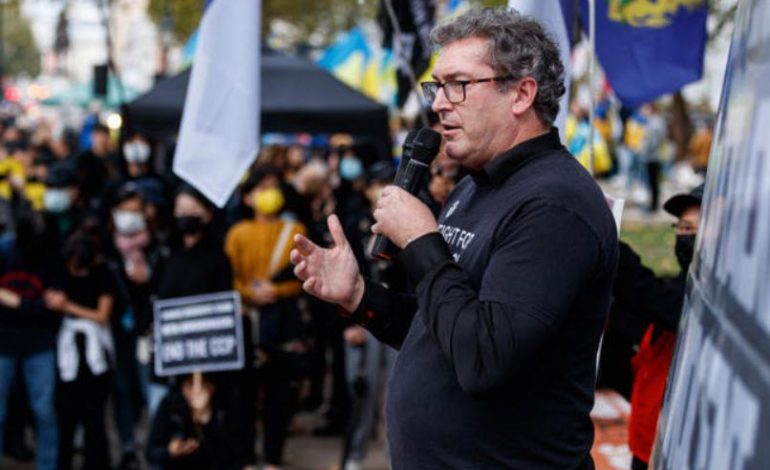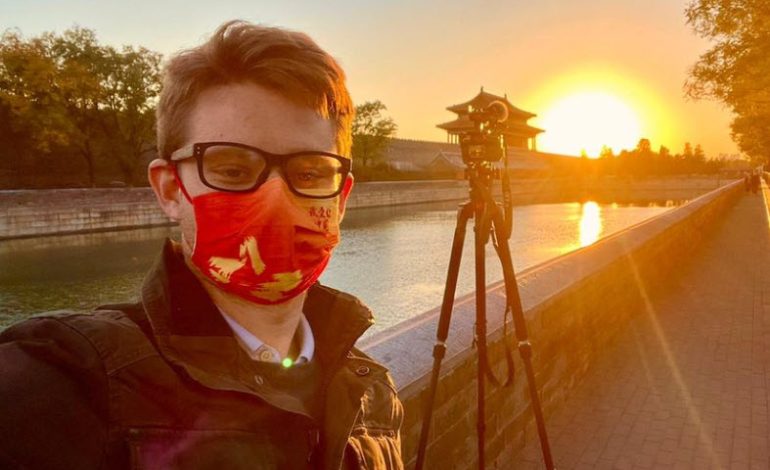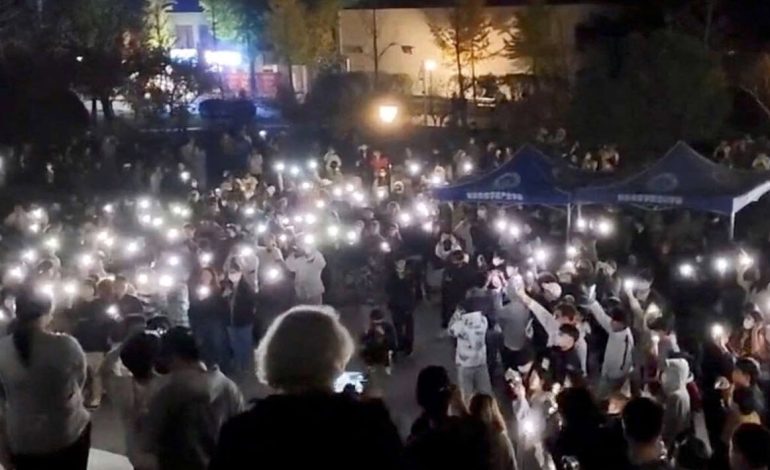
China is not our partner: Three scenes from a regime gone rogue
28 November 2022
By Benedict Rogers
In this extract of The China Nexus, Benedict Rogers describes being denied entry to Hong Kong on the orders of the Chinese Communist Party regime, and an assault a year later by a Chinese agent at the U.K. Conservative Party Conference. He concludes that a regime that behaves in this way, as well as committing genocide against the Uyghurs, atrocities in Tibet, forced organ harvesting, dismantling Hong Kong’s freedoms in breach of an international treaty and a crackdown on civil society across China, is not a regime we should partner with.
——
As the plane took off from Hong Kong’s Chek Lap Kok airport and I looked out of the window at the sheer beauty of that dynamic city — ranging from the skyscrapers and tower blocks to the lush, hilly green islands amidst the shimmering sea, with ships and boats dotted around this major global trading centre — a lump formed in my throat and my eyes welled up. The thought sunk in that, in all likelihood, I would never be able to return to the city that had once been my home, where I had begun my working life — at least until there is a change of regime in Beijing.
It was Oct. 11, 2017, three years before the imposition of Beijing’s draconian National Security Law on Hong Kong and just over 20 years after I had moved to Hong Kong for my first job as a fresh graduate. A couple of hours earlier, I had landed for what was intended to be a private visit to meet old friends and new contacts, to learn about their latest concerns about the situation in the territory.
I had not been planning any public appearances, speeches, or media interviews and was not intending to “pick quarrels or provoke trouble” (a criminal offence in China). The worst I would have done — from the Chinese Communist Party’s point of view — is perhaps to have written an op-ed and maybe a short report that only a few people would have read.
I joined the line for immigration, and when it was my turn I approached the immigration desk in the usual way, and presented my passport. The young female immigration officer typed my details into the computer.
Suddenly, her face and body language changed. A look of fear came across her.
“I will have to call my superior,” she said nervously.
Her supervisor came, looked at the computer, and then politely told me that there was a problem. I was taken aside to an office in a corridor behind the immigration counters. But before they could take me in for questioning, there was a moment of farce. The office was locked.
“Please wait here, while I try to find the key,” he said.
I was left alone in the corridor for several minutes. Of course, I could not have gone anywhere, but I was able to make two calls — one to the British Consulate-General, and one to another key contact. The immigration officer then returned, and we were joined by several other officials. I was questioned, requested to provide my hotel booking, and then informed that they had orders from Beijing not to permit me to enter Hong Kong. They were denying me entry.
A very key contact offered me the support of a very prominent lawyer, who would come to the airport to represent me. The lawyer called me during my interrogation and asked me to enquire with the immigration officers whether, if he came, they would allow him access to me. They said they would — if he arrived in time. A few minutes later, they escorted me to the plane. He called me just as I was boarding to tell me he had arrived at the airport, but it was too late.
The fact that I feel I should not name those who tried to help me says so much about the climate of fear that has engulfed Hong Kong since that incident. They are household names, yet both now are serving sentences for their peaceful pro-democracy activities, and I certainly do not want to add to their woes.
I was marched to the plane, surrounded by half a dozen or more immigration officers. As we left the immigration office for the journey to the van to be driven across the tarmac, and then up the gangway to the plane, I joked with their superior, pointing at the crowd of uniformed officers that had formed a circle around me as I walked, asking, “Are they all for me?”
She returned my smile, and said yes, they were all for me.
At the gate, after all the other passengers had boarded and before I — a “pariah,” persona non grata — was permitted on board, I turned to the one remaining immigration officer who was guarding me. He was the last person I spoke to as I walked up the gangway to the plane; indeed, the last person I spoke to in person, face to face, and on the ground in Hong Kong.
“Is this the death of ‘one country, two systems’?” I asked. “Does this mean “one country, one system’?”
He looked at me pleadingly. “Please, I am just doing my job. I can’t comment,” he replied.
“I know. And thank you for treating me well,” I said, for they had handled my deportation with typical Hong Kong courtesy.
But having been deported from Myanmar twice (I try not to make a habit of it), I could not let the unreasonableness of the system go unchallenged, so I said, “This is a sad day. It’s sad for me personally, but even sadder in terms of what it represents for Hong Kong.”
With a little glistening hint of emotion in his eyes, my one remaining companion before boarding the plane — a Hong Kong immigration officer — replied, “Yes. It is a sad day.” The Hong Kong officials, I felt, did not enjoy deporting me, but were just following orders.
Little did I know what would then follow in the subsequent years in Hong Kong and China. That tiny incident was just an hors d’oeuvre. The total crackdown, police brutality, and dismantling of every basic freedom in every space in the city is truly shocking. Most of my friends from Hong Kong today are now in prison, on trial, keeping their heads down, or in exile.
Threats at home
Almost exactly a year later, I sat on a panel at the Conservative Party Conference in Birmingham, alongside the father of Hong Kong’s democracy movement, Martin Lee; one of the Umbrella Movement organizers, Benny Tai; and Nathan Law, who had been both the youngest ever elected legislator in Hong Kong and one of the city’s first political prisoners. Just as we were drawing to a close, I was invited by the chair — a courageous MP, Fiona Bruce, who at the time chaired the Conservative Party Human Rights Commission — to give some closing remarks.
Partway into my brief comments, in which I emphasized that I am pro-China as a country and it is because I love China and the peoples of China that I oppose the Chinese Communist Party (CCP), a Chinese woman in the second row sprung into a furious rage. Kong Linlin, a reporter for CGTN, a Chinese-state media organization, literally screamed at me for several minutes with a venom I have never experienced before.
“You are a liar,” she yelled.
“You are anti-China. You are trying to destroy China.”
When a young Hong Kong activist, Enoch Lieu, approached her — with remarkable calm, composure, and courtesy — to ask her to resume her seat, she slapped him several times. Her final slap was caught on camera and the video went viral, causing worldwide news. She was arrested and subsequently charged with, and convicted of, common assault. Of course, the Chinese Embassy was furious at her arrest and did everything possible to subvert the course of justice.


